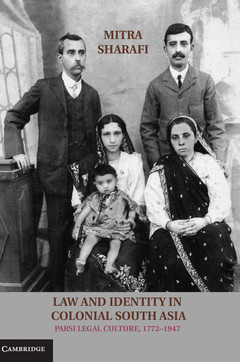Description
Law and Identity in Colonial South Asia
Parsi Legal Culture, 1772–1947
Studies in Legal History Series
Author: Sharafi Mitra
This book explores the legal culture of the Parsis, an ethno-religious community unusually invested in the colonial legal system of British India and Burma.
Language: English
Subject for Law and Identity in Colonial South Asia:
Approximative price 107.81 €
In Print (Delivery period: 14 days).
Add to cart
Law and Identity in Colonial South Asia
Publication date: 04-2014
Support: Print on demand
Publication date: 04-2014
Support: Print on demand
Approximative price 32.87 €
In Print (Delivery period: 14 days).
Add to cart
Law and Identity in Colonial South Asia
Publication date: 09-2016
Support: Print on demand
Publication date: 09-2016
Support: Print on demand
Description
/li>Contents
/li>Biography
/li>
This book explores the legal culture of the Parsis, or Zoroastrians, an ethnoreligious community unusually invested in the colonial legal system of British India and Burma. Rather than trying to maintain collective autonomy and integrity by avoiding interaction with the state, the Parsis sank deep into the colonial legal system itself. From the late eighteenth century until India's independence in 1947, they became heavy users of colonial law, acting as lawyers, judges, litigants, lobbyists, and legislators. They de-Anglicized the law that governed them and enshrined in law their own distinctive models of the family and community by two routes: frequent intra-group litigation often managed by Parsi legal professionals in the areas of marriage, inheritance, religious trusts, and libel, and the creation of legislation that would become Parsi personal law. Other South Asian communities also turned to law, but none seem to have done so earlier or in more pronounced ways than the Parsis.
Introduction; Part I. Parsi Legal Culture: 1. Using law: colonial Parsis go to court; 2. Making law: two patterns; Part II. The Creation of Parsi Personal Law: 3. The limits of English law: the Inheritance Acts; 4. Reconfiguring male privilege: the Matrimonial Acts; 5. The jury and intra-group control: the Parsi Chief Matrimonial Court; Part III. Beyond Personal Law: 6. Entrusting the faith: religious trusts and the Parsi legal profession; 7. Pure Parsi: libel, race, and group membership; Conclusion: law and identity; Appendix: legislation.
Mitra Sharafi is a legal historian of South Asia. She is Associate Professor of Law and Legal Studies at the University of Wisconsin, Madison, with History affiliation. She hosts the South Asian Legal History Resources website.
© 2024 LAVOISIER S.A.S.




